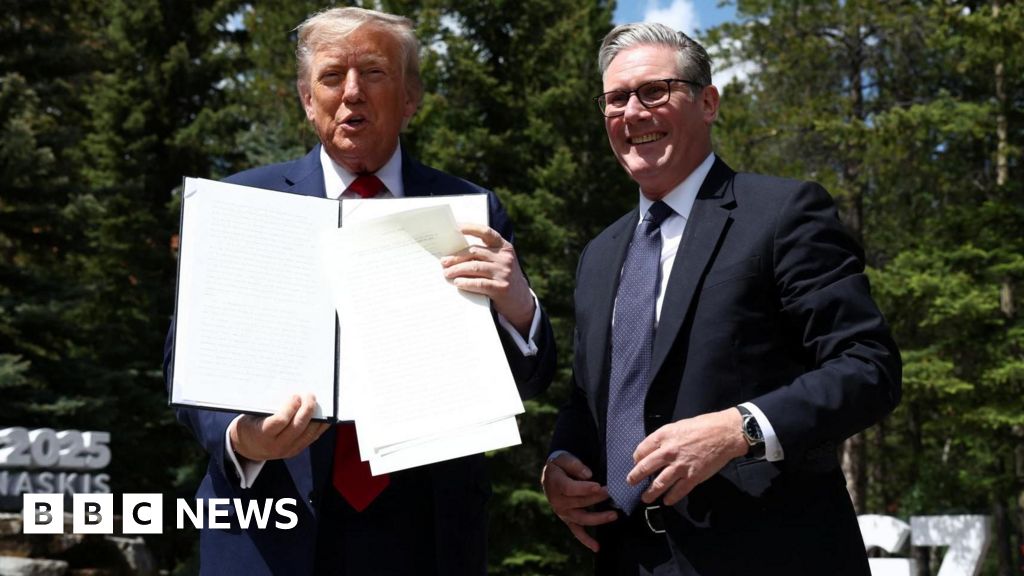This had all the hallmarks of Trumpian political theatrics. In the Canadian sunshine here in the Rockies at the G7 summit, President Trump emerged from a meeting with Sir Keir Starmer brandishing a folder. Within it wasthe deal US and UK officials have been putting togetherto flesh out a tariffs agreement struck last month. Alas, Trump's papers broke free and tumbled to the tarmac. The prime minister was quick to bend down to pick them up. Amid the tariff turbulence coming from the White House, this is a triumph - up to a point - for Downing Street. The aerospace industry will see tariffs removed completely and there will be a 10% levy on the car industry. Twice in the last couple of months the prime minister has dashed to Jaguar Land Rover's plant in Solihull in the West Midlands - first, when huge tariffs were imposed, and then again when it looked like something of a reprieve could be imminent. There is no doubt there was deep concern in the region and in government that, unless a deal was done, the job losses could be significant. The expectation is this deal will prevent that. There is one wrinkle: while UK government officials point out that Britain is the only country to be exempt from the global tariff of 50% on steel and aluminium, a 25% tariff remains. Negotiations to remove this continue. I am told it is over a technicality of being able to prove that steel has been made in the UK, rather than imported and merely tweaked – and this is harder than it may seem. There is also a deal for reciprocal access to 13,000 metric tonnes of beef being sold each way – meaning British farmers can export beef to the US. Officials insist there has been no change to the UK's food safety standards in making this happen. Taking a step back, this isn't the full fat US-UK trade deal some once envisioned - and, as ever with President Trump, it has been reached in a rather unorthodox way. But, amid his domestic political woes, it is an achievement for the prime minister on the international stage that few other leaders can boast of.
Chris Mason: Tariffs deal a triumph for Starmer - up to a point
TruthLens AI Suggested Headline:
"Starmer Achieves Key Tariffs Agreement with Trump at G7 Summit"
TruthLens AI Summary
In a display reminiscent of Trump's characteristic political theatrics, the G7 summit in the Canadian Rockies saw President Trump and UK Prime Minister Sir Keir Starmer engage in discussions that culminated in a significant tariffs agreement. This agreement is particularly noteworthy for the aerospace sector, as it entails the complete removal of tariffs. However, the car industry will still face a 10% levy, which has raised concerns in regions heavily reliant on automotive manufacturing, such as the West Midlands. Starmer's recent visits to Jaguar Land Rover's plant underscore the urgency surrounding tariff negotiations, with fears of potential job losses looming if a deal had not been reached. The expectation is that this new arrangement will alleviate those concerns, although it does not fully resolve the complexities surrounding steel tariffs, where a 25% tariff remains in place pending further negotiations regarding the origin of the steel produced in the UK.
Moreover, the deal includes provisions for reciprocal access allowing the export of 13,000 metric tonnes of beef between the US and the UK, which is a positive development for British farmers. Officials have clarified that this arrangement does not compromise the UK's food safety standards, which was a significant consideration during negotiations. While this agreement represents a diplomatic win for Starmer on the international stage, it is crucial to note that it falls short of the comprehensive US-UK trade deal that many had anticipated. The unconventional nature of the negotiations, typical of Trump's approach, further complicates the perception of this deal. Nevertheless, the agreement marks a notable achievement for the Prime Minister amid the challenges posed by Trump’s domestic political landscape, setting a precedent for future UK trade relations with the US.
TruthLens AI Analysis
You need to be a member to generate the AI analysis for this article.
Log In to Generate AnalysisNot a member yet? Register for free.
